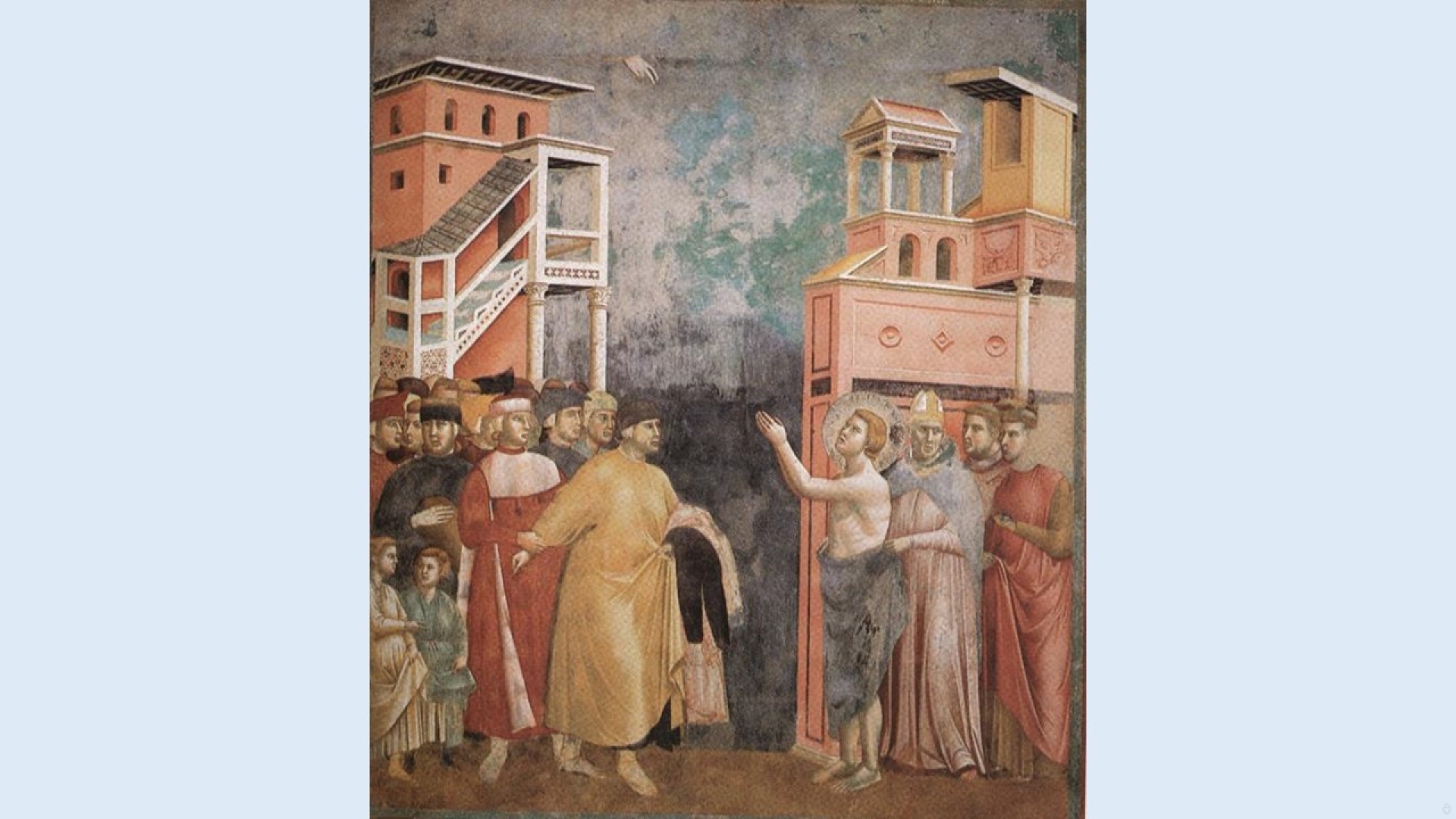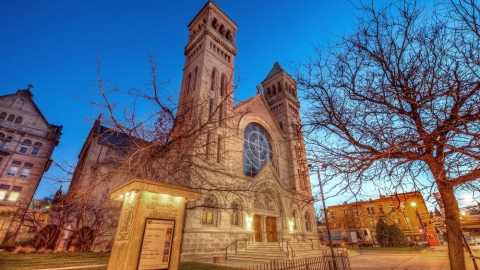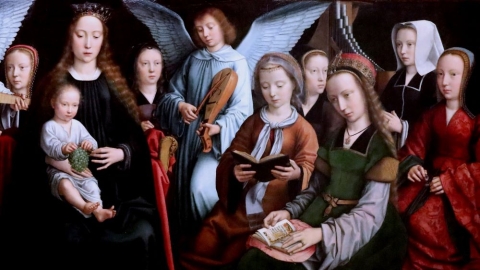The Holiness of the Church (15): Poverty

St. Francis of Assisi renouncing everything
The Gospel praises poverty in very strong terms: “Blessed are ye poor, for yours is the kingdom of God.... But woe to you that are rich: for you have your consolation” (Lk 6:20, 24). In countless passages, Our Lord praises poverty and curses wealth, which is presented as one of the most dangerous occasions for damnation.
How did the saints of the Roman Church understand these words?
The Church has understood poverty as one of the “evangelical counsels.” Some Christians, in accordance with the Gospel, are called to effectively abandon the ownership of their goods and to live in poverty, even with the corresponding vow, as this is the case for perfect chastity or obedience.
However, every Christian, even if he has goods, is called to interiorly prefer poverty to wealth, if he does not want to be “choked” by riches, as the parable of the sower says. It is only on this condition that he will be able to go through the famous “eye of the needle.” It is the radical means, willed by the Lord, to overcome the concupiscence of the eyes which is in the world (cf. 1 Jn. 2:16-17).
Poverty as Contempt for Earthly Goods
In the statutes of the Society of Saint Pius X, Archbishop Lefebvre recommends to priests “the spirit of poverty,” without however requiring a vow, and he does so with a simple remark full of all Christian spirituality: “A great love of God, of the Most Holy Trinity, will inflame the hearts of the members of the Society. This charity must be such that it naturally engenders virginity and poverty.”
He presents poverty as a manifestation of that charity which, as we saw at the beginning of this series of articles, formally constitutes holiness. The ardent love of God indeed leaves no room for love of the goods and pleasures of this world, just as the ardent love of the things of this world necessarily leads to pride and hatred of God.
The saints therefore practiced contempt for the things of this world to make room for the love of God, certainly not out of a Gnostic hatred of matter. In this, the poverty of the Catholic saint has nothing to do with the metaphysical contempt for being of the Buddhist monk. The Christian scorn of goods is the love of the Supreme Being, God, before which any other thing loses its value, to the point that one can even speak of “contempt.”
The Catholic saint, living in poverty, only brings his heart closer to the true treasure, that heavenly treasure where thieves “neither defile nor steal” (Mt 6:19). St. Gregory the Great said: “Brothers, if you want to be rich, love true riches.”
Poverty as Charity Towards One’s Neighbors
Parallel to renunciation of things for the love of God, there is the aspect of self-emptying in order to give to one's neighbor, as the Gospel itself teaches: “go, sell whatsoever thou hast, and give to the poor, and thou shalt have treasure in heaven; and come, follow me” (Mk 10:21).
Many saints who possessed great wealth did not hesitate to dispose of it in this way: St. Francis himself began his path to holiness by giving to the poor the money that his father, the wealthy merchant Pietro Bernardone, made available to him. The love of poverty, which the saint would later call his wife, made him see possessions only as a means of helping his neighbor; indeed, when his father wanted to prevent him from using them in this way, St. Francis preferred giving up everything.
The saints who did not want wealth and gave it to the poor are legion: St. Charles Borromeo inherited from his brother the very rich principality of Oria, but immediately sold it for the sum of forty thousand crowns, which he distributed to the needy in a single day. Likewise, St. John Baptist de la Salle renounced his canonical income and his family property in the name of poverty and to help the needy.
Saints who managed great wealth because of the position to which they were called also did so in this spirit.
Although possessing great wealth, the holy kings or pontiffs often lived in extreme poverty, without taking advantage of their power to lead a comfortable life. We know that when dying, St. Pius X could say in all truth: “I was born poor, I lived poor, and I am sure of dying very poor. Of the goods of the Church, he had used nothing for himself or for his own.
Poverty as a Vow
As we have seen, those who want to closely follow Jesus Christ in the state of perfection can indeed renounce possessions, even by making a vow, and not only maintain the spirit of poverty, just as they renounce pleasures, even licit ones, with the vow of chastity, and their own will with the vow of obedience
Every religious of the Catholic Church makes a profession of poverty, renouncing the possession or at least the use of his goods. This state of life is completely absent from Protestantism and goes back to the way of life of the apostles and the first hermits and monks.
The official consecration of these choices through public vows, guaranteed by rules and the authority of the ecclesiastical society, is a clear sign of the will of the Church not to renounce following to the letter the call to perfection launched by the Gospel.
Even if few people are called to follow Christ in this way, the whole Church does everything possible to ensure that this sign of credibility is not lacking. In fact, along with chastity, poverty and disinterestedness in earthly goods have always been the most immediately perceptible apologetic motive, even among simple people, as St. Paul already testified.
Poverty and Fatherhood of God
Witnessing the genuine poverty of the saints truly enables us to understand the main truth revealed by Jesus Christ: the Fatherhood of God. This link is explicitly taught by Our Lord Himself: “Be not solicitous therefore, saying, What shall we eat: or what shall we drink, or wherewith shall we be clothed? 32 For after all these things do the heathens seek. For your Father knoweth that you have need of all these things” (Mt 6:31-32).
We leave the conclusion here to the great spouse of poverty, St. Francis, at the moment when he abandoned all the goods of his earthly father, before the Bishop of Assisi. He seized this liberation from the bonds of the world to be immediately reunited with his only Principle and Father, without hindrance. Thus speaks the Legenda Maior:
“When he returned everything to his father and, having laid down his clothes, he renounced his paternal inheritance and temporal goods, he exclaimed: ‘From now on I can say with certainty: Our Father who art in Heaven.’”
Related links
- The Holiness of the Church (1): Dogma
- The Holiness of the Church (2): The Apologetic Mark
- The Holiness of the Church (3): The Virtue of Faith-1
- The Holiness of the Church (4): The Virtue of Faith-2
- The Holiness of the Church (5): The Virtue of Hope
- The Holiness of the Church (6): The Virtue of Charity-1
- The Holiness of the Church (7): The Virtue of Charity-2
- The Holiness of the Church (8): The Virtue of Prudence
- The Holiness of the Church (9): The Virtue of Justice
- The Holiness of the Church (10): The Virtue of Religion
- The Holiness of the Church (11): Piety and Obedience
- The Holiness of the Church (12): The Virtue of Fortitude and Martyrdom
- The Holiness of the Church (13): The Virtue of Fortitude and Its Related Virtues
- The Holiness of the Church (14): The Virtue of Temperance
(Source : DTC - FSSPX.Actualités)
Illustration : Giotto, domaine public, via Wikimedia Commons





